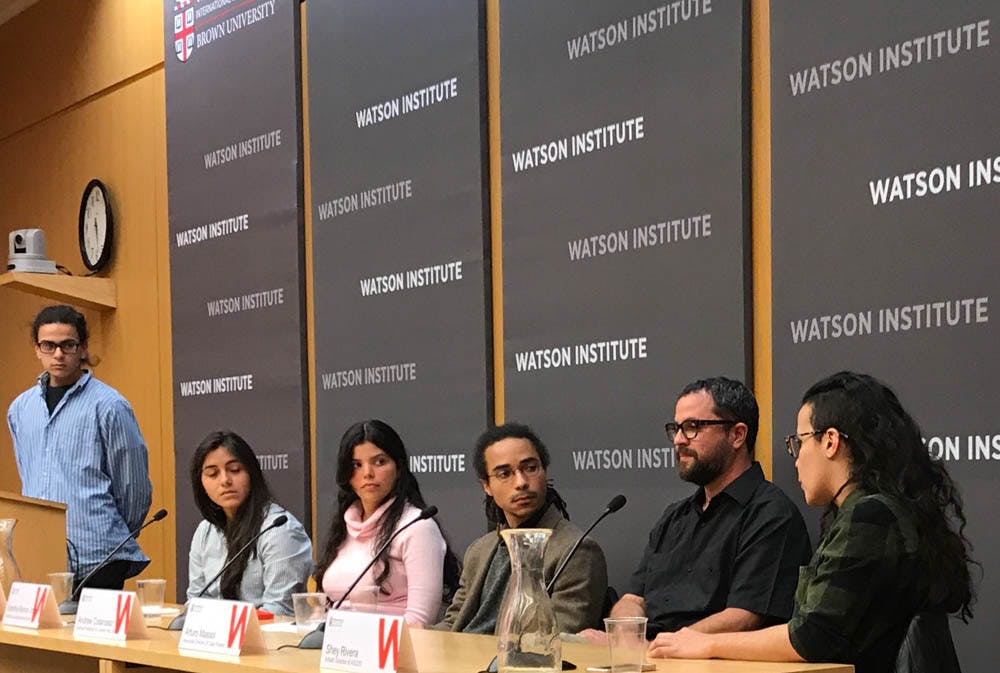Seven months have passed since Puerto Rico was hit by Hurricane Maria, a category four storm that tore across the island and left destroyed houses, cities and lives in its wake. Puerto Rico continues to experience the ramifications of the hurricane as the entire island lost power in a blackout yesterday.
In response, the Center for Latin American and Caribbean Studies hosted a panel of five people who were personally affected by the hurricane and have played a role in the island’s ongoing recovery. The panel included Herald Senior Reporter Coral Murphy and Katerina Ramos-Jordan ’20, students who formerly attended the University of Puerto Rico until they were displaced by the storm and enrolled at Brown to continue their education. It also featured Andrew Colarusso, visiting assistant professor of literary arts, Shey Rivera, artistic director of AS220 and Arturo Massol, associate director of Casa Pueblo — a nonprofit organization that advocates for environmental conservation and community-based activism.
The prevailing theme throughout the discussion was why resilience was integral to Puerto Rico’s ongoing recovery efforts, as grassroots efforts have spearheaded the rebuilding process since the hurricane, Murphy said. The first of those who responded to help were the people of Puerto Rico themselves, as small communities, churches and schools began to work toward reconstruction efforts before the government, Murphy added.
For example, Massol started a project called “Light up Puerto Rico with the Sun,” which asked people to send solar energy lamps to the island to respond to the destruction of most of Puerto Rico’s outdated power system. The project aims to improve quality of life and to encourage people to embrace renewable energy, Massol said.
The panel expressed concerns regarding the island’s relationship with the United States’ federal government. The hurricane “lifted the veil” on wounds that were established when the island was colonized, Rivera said. The term “resilience” confuses the issue, Colarusso said. He added that it is not resilience that the island needs; rather, Puerto Ricans need to recover and treat these colonial issues. “What (we) really need is to address fundamental wounds that have gone unaddressed for centuries and continue to fester without treatment,” he said. In addition, U.S. government oversight has undermined the grassroots movements that have been truly helping, which is “incredibly insidious,” Colarusso said.
“(The government) has done something — mistreated the people,” Massol said. Government intervention is actually counteracting local efforts by making Puerto Rico more dependent upon the United States, he added. In the days following the hurricane, when people were without water, the U.S. government sent gallons of water. Massol stated that this failure to send water filters instead, which Puerto Ricans could use to purify their own water, exemplifies the American government’s attempts to assert control and force the island’s dependence, Massol said.
“We survived the natural event. We are having difficulties with surviving the government disaster,” Massol said.
There is an extreme distrust of the government as a means of helping people, Massol said. This has come in large part with a discrepancy between what the Puerto Ricans request and what they are given; for example, when they requested lamps, they were given tarps to replace their roofs. The local government also lacked a distribution protocol, Rivera said. Rather than landing in the hands of the people, aid items shipped to Puerto Rico would remain on the dock, she added.
The recovery process should focus on developing self-sufficiency and trust. Going forward, Puerto Ricans should strive to “take control and ownership of their own narratives,” Rivera said. All of the panelists noted the importance of achieving Puerto Rican autonomy as the island recovers.





